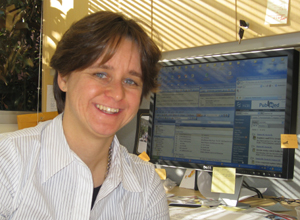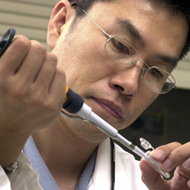
Environmental Factor, January 2008, National Institute of Environmental Health Sciences
Former Postdoc Awarded Cancer Scholarship
By Eddy Ball
January 2008

Less than eight months after completing her postdoctoral fellowship at NIEHS, molecular geneticist Francesca Storici, Ph.D., became one of 29 researchers selected as Georgia Cancer Coalition Distinguished Cancer Scholars for 2008. As a scholarship winner, Storici, now an assistant professor at the Georgia Institute of Technology School of Biology, will receive $50,000 in Coalition funding annually for the next five years.
“The award is an honor and provides very good support as I am setting up my lab here at Georgia Tech,” Storici said after the announcement. “It will be a great help in recruiting students and acquiring specialized equipment for my research.”
Storici attended the University of Trieste in Italy, where she qualified as a biologist and earned a Ph.D. in molecular genetics from the International School for Advanced Studies. She worked at the International Center for Genetic Engineering and Biotechnology there under the direction of Carlo Buschi, Ph.D., in the Yeast Molecular Genetics Group.
From 1999 to April 2007, she held positions as a visiting and then research fellow in the Chromosome Stability Group of the Laboratory of Molecular Genetics, headed by Mike Resnick, Ph.D. Just before joining the School of Biology at Georgia Tech, Storici conducted a few months internship as research assistant professor at the Gene Therapy Center of the University of North Carolina at Chapel Hill, directed by Jude Samulski, Ph.D.
“NIEHS was an incredibly exciting opportunity and a journey of professional growth for me. It’s an experience I could never have had in Italy and one that has influenced me profoundly,” Storici said of her fellowships at the Institute. “Mike, Dmitry [Gordinin, Ph.D.], and my other colleagues there helped me learn how to be a scientist and helped me keep in mind that there is always more to learn.”
In her work at NIEHS and in her own lab at Georgia Tech, Storici uses the yeast Saccharomyces cerevisiae model organism and mammalian cells to trace the molecular mechanisms involved in the repair of broken DNA. A focus of her research is studying the mechanisms by which RNA can directly record itself into the DNA genome, following the discovery of RNA-templated DNA repair when still at NIEHS, work recently published and podcast in Nature (http://www.ncbi.nlm.nih.gov/sites/entrez?Db=pubmed&Cmd=ShowDetailView&TermToSearch=17429354&ordinalpos=1&itool=EntrezSystem2.PEntrez.Pubmed.Pubmed_ResultsPanel.Pubmed_RVDocSum) ![]() . Her objectives are directed also toward developing more effective and safe technologies of genome modification as unique tools for structure/function studies as well as for medical and industrial applications.
. Her objectives are directed also toward developing more effective and safe technologies of genome modification as unique tools for structure/function studies as well as for medical and industrial applications.
A major accomplishment during her tenure at NIEHS was Storici’s development of one of the most powerful approaches for targeted genome correction with synthetic oligonucleotides, known as delitto perfetto (http://videocast.nih.gov/pdf/dnarig_STORIC_061504.pdf) ![]()
![]() , Italian for “perfect murder.” Storici named the approach after the Italian title of Alfred Hitchcock’s film, “Dial M for Murder,” because the approach provides in vivo selection for almost any chromosomal modification and leaves no trace of the material used at the “scene” of the targeted mutation. Storici, who is known among colleagues for her sense of humor, also noticed that yeast mutated using delitto perfetto showed an uncanny resemblance to the corpulent director.
, Italian for “perfect murder.” Storici named the approach after the Italian title of Alfred Hitchcock’s film, “Dial M for Murder,” because the approach provides in vivo selection for almost any chromosomal modification and leaves no trace of the material used at the “scene” of the targeted mutation. Storici, who is known among colleagues for her sense of humor, also noticed that yeast mutated using delitto perfetto showed an uncanny resemblance to the corpulent director.
This system is highly defined and offers researchers a powerful tool for dissecting complex repair and recombination processes and identifying the function of genes relevant in pathways of damage repair and cancer. With this approach, Storici also endeavors to characterize the mechanisms by which certain types of tumor cells acquire a high DNA repair potential and develop resistance to treatment by ionizing radiation.
Incorporated in 2001, the Georgia Cancer Coalition (http://www.georgiacancer.org/) ![]() was created to coordinate cancer-dedicated expenditures from the State’s share of the National Tobacco Settlement Trust Fund. Over the past six years, it has named 113 Distinguished Scholars, 12 of whom have been Georgia Tech faculty. The Coalition’s awards maximize the investment in cancer research by sponsoring institutions, which provide at least a dollar-for-dollar match in research support for scientists. The Coalition is the first non-profit of its kind in the nation, and it is quickly gaining recognition as a model for programs in other states.
was created to coordinate cancer-dedicated expenditures from the State’s share of the National Tobacco Settlement Trust Fund. Over the past six years, it has named 113 Distinguished Scholars, 12 of whom have been Georgia Tech faculty. The Coalition’s awards maximize the investment in cancer research by sponsoring institutions, which provide at least a dollar-for-dollar match in research support for scientists. The Coalition is the first non-profit of its kind in the nation, and it is quickly gaining recognition as a model for programs in other states.
"NTP Board..." - previous story ![]()
![]() next story - "Environmental Justice..."
next story - "Environmental Justice..."
January 2008 Cover Page



